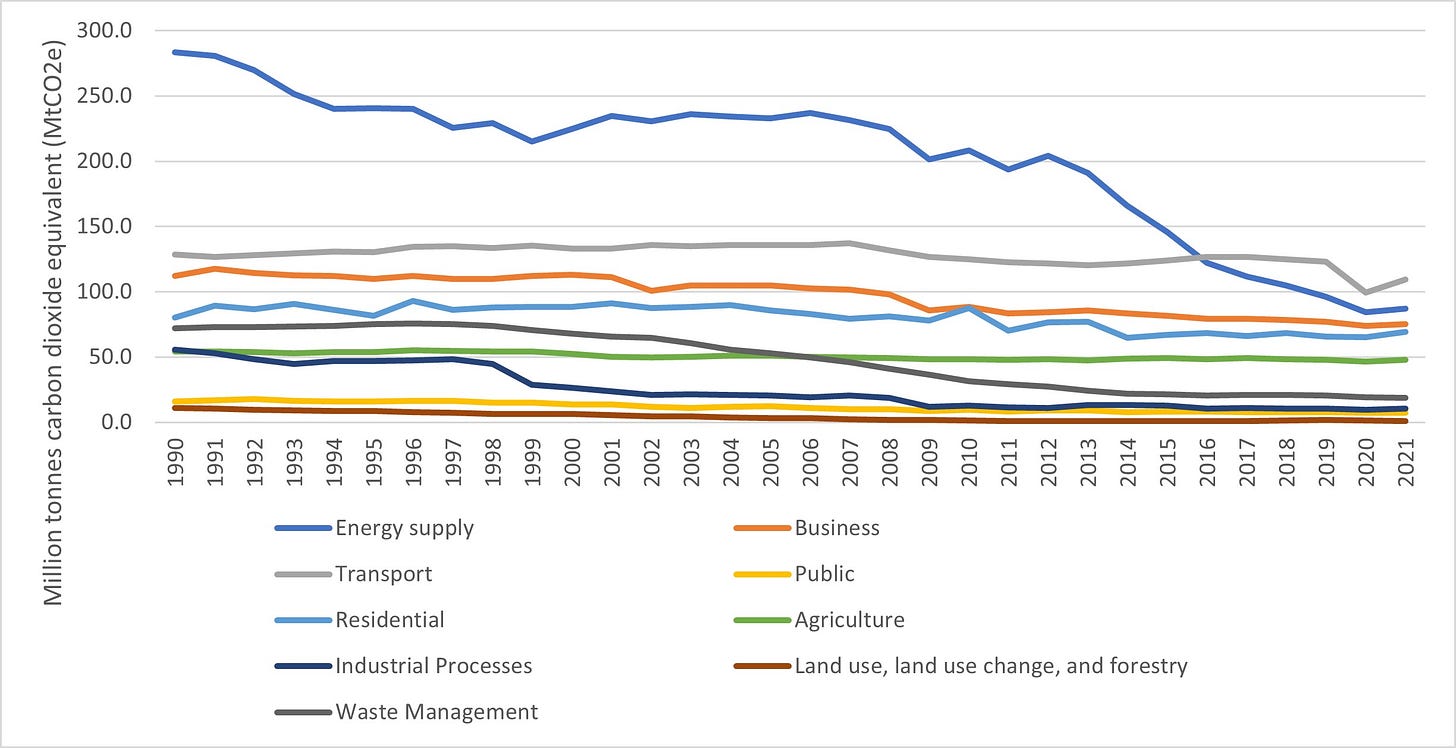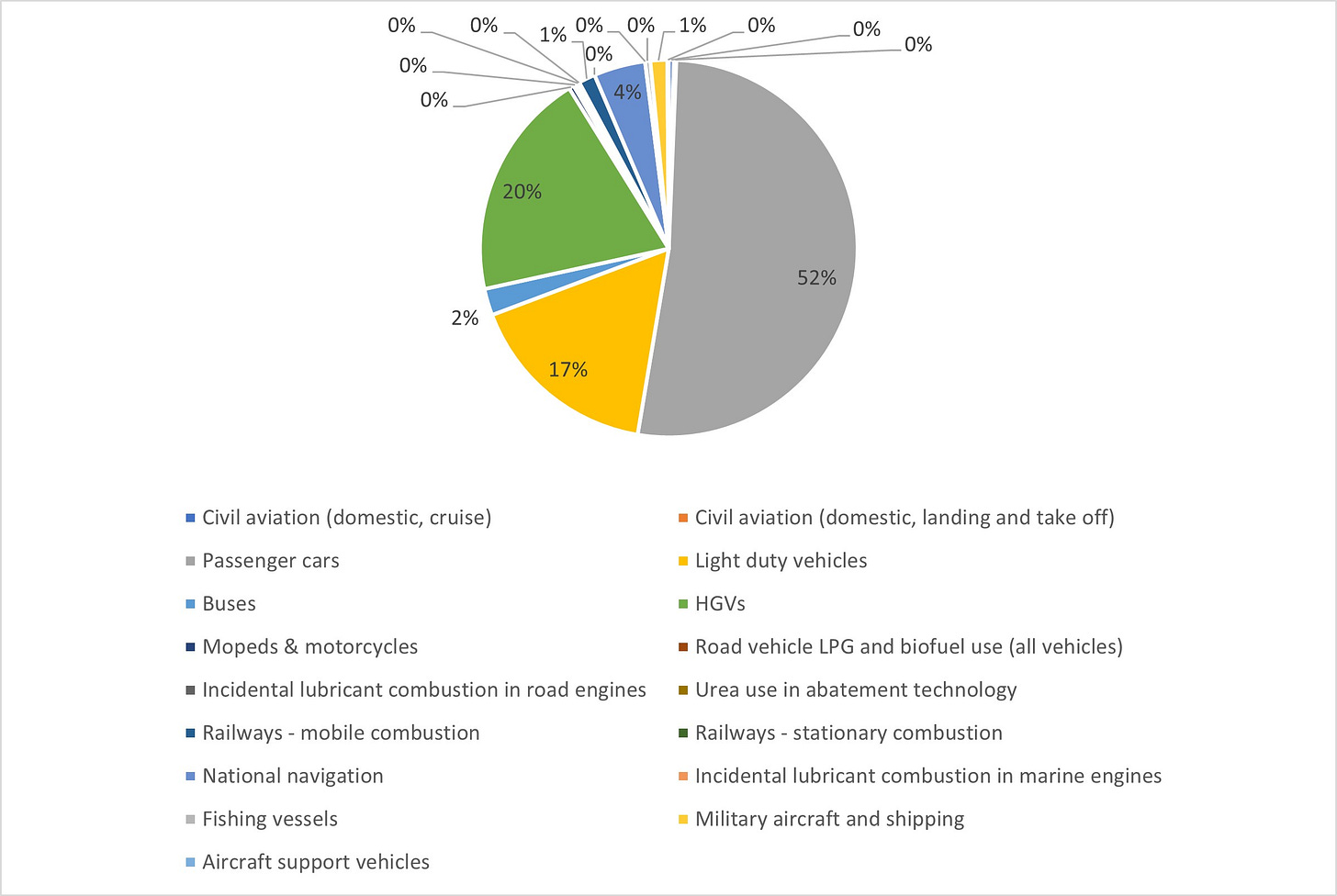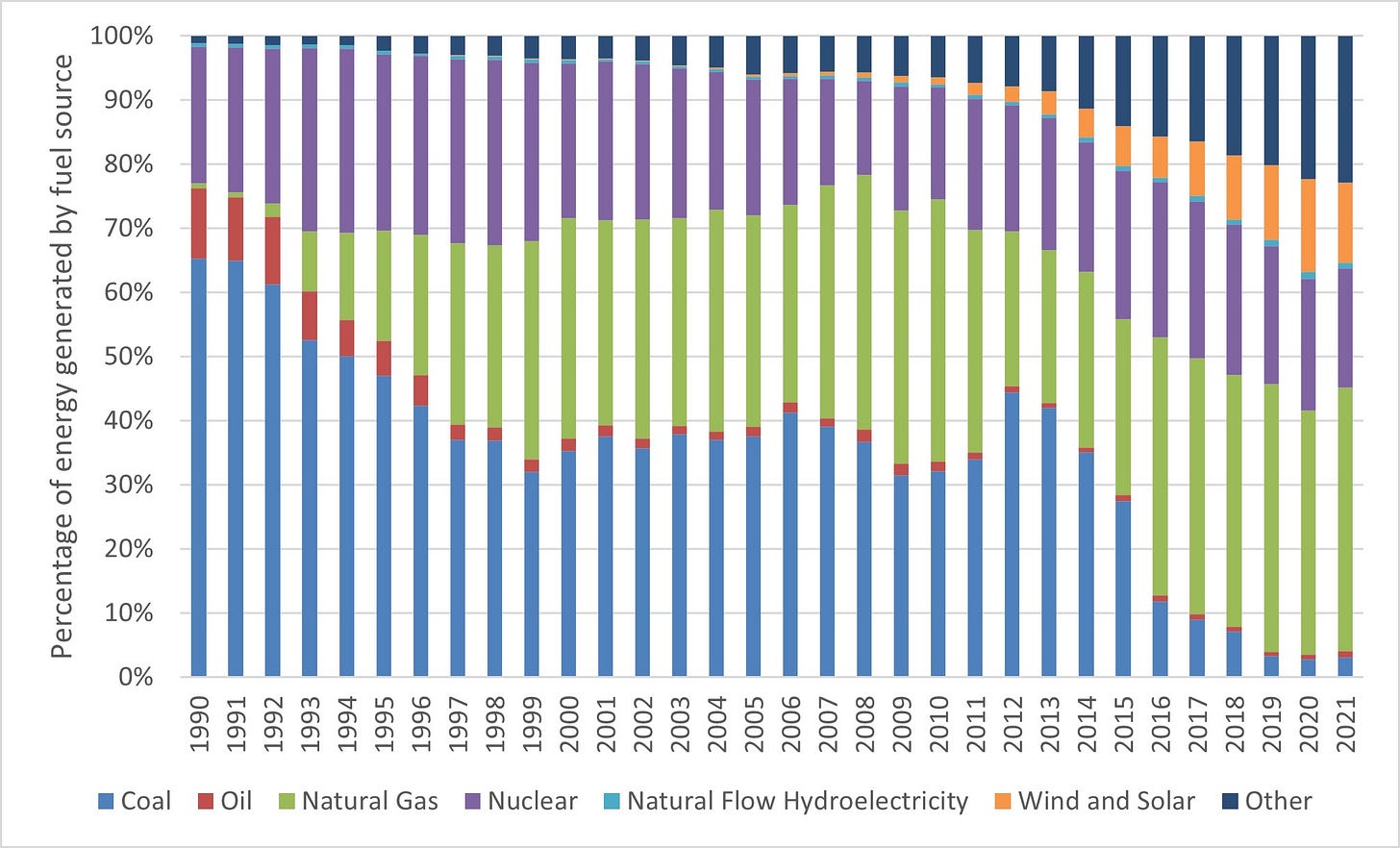💡 Lights On - MM#627
As transport struggles to decarbonise, its time it learned lessons from a sector that has.
Good day my good friend.
Over the coming days, there will be a lot of things written about COP28. The announcements that may or may not happen, the news of compromised lead delegations from key countries, and the influence of the dying fossil fuel industry that doesn’t know its time is up yet. Lots of blah, blah, blah, as someone once said.
If you are looking to COP for inspiration on climate action, or towards political leadership, you are looking in the wrong place. You need to be looking at the people fighting for, and winning, the pedestrian crossings on the main road in their areas. You need to look to people in communities in the likes of Oxford fighting for low traffic neighbourhoods. You need to look at public attitudes that overwhelmingly favour environmental policies.
You also need to look at increasing investment in green technologies. The fact that renewable energy is now eating into the capacity provided by fossil fuels in energy generation. So much so that just this on its own may save us from the very, very worst of climate change. You need to look at the overwhelming number of young people flocking to careers in sustainability, and the growing number of people working on climate change and its associated issues. And yes, you need to look at the increasing ownership of electric vehicles.
More needs doing, and more quickly. But don’t make the mistake of assuming a disappointing COP means nothing is being done. Because a lot is happening. The only way out of this is if we fight like hell for it. And we are. And we are slowly winning. Remember that.
If you like this newsletter, please share it with someone else who you think will love it. The main way my audience grows is through your recommendations. I will love you forever if you do. ☺️
James
👋 Left Behind
With COP kicking off, I figured that it is worthwhile bringing out this graph of the UK’s carbon emissions since 1990, and how things have changed by the different sectors. The good news is that, overall, the UK has reduced the carbon it emits every year - by about 48% in all.

Not only that, the reduction has been across all sectors of the economy. The shining star in this is energy supply, which cut its emissions by 69% in that time to go from by far and away the largest emitting sector to the second largest. Land use (90%), Industrial Processes (81%) and Waste Management (74%) did better in percentage terms, but in terms of the sheer amount of carbon cut, energy supply has done the heavy lifting.
While transport has achieved a 15% reduction in emissions since 1990, it is now the UK’s carbon emissions problem child. In 2021, the UK’s transport sector emitted 109 million tonnes of carbon into the atmosphere, more than any other sector of the economy. The overwhelming majority of it came from road transport, namely private cars and HGVs. Interestingly, while there are lots of headlines about private jet use, civil aviation makes up barely 0.6% of total transport emissions.

In terms of decarbonisation, there is a lot that the transport sector can learn from the energy supply sector. In the transport sector we constantly get into disagreements about whether we should be decarbonising what is done currently, or whether we need to be reducing demand for high carbon emissions. Meanwhile, the energy supply sector simply stated this:
Why don’t we do both?
In terms of decarbonising energy supply, there has been substantial progress. The main transition has been away from the most polluting fossil fuel - coal. Wind and solar have also grown as a fuel source since 1990. The result is that the energy intensity of the electric grid has reduced hugely, going down by 27% since 2000.

But where the truly miraculous work has been done has been - in a time when economic growth has continued, and the population has grown - the UK has actually reduced its electricity consumption. The peak for UK electricity consumption was in 2005, when the UK consumed 357 Terawatt-hours of electricity. In 2021, that was down to 292 Terawatt-hours. And for those of you thinking about COVID-19 as a factor, in 2019 it was 305 Terawatt-hours.

Further to this, a key strategy of National Grid as the Energy System Operator (ESO) is demand management. Many of my UK readers may have heard of the Demand Flexibility Service, where users are paid a reward for cutting their energy use when the strain on the electric grid is high. Analysis by the Centre for Net Zero has indicated that over the Winter of 2022/23, participants reduced their electricity use by up to 40% during “demand flexibility events” (i.e. they were asked to switch non-essential stuff off).
But this is not something that is new. Providing electricity is a fine balancing act. Too much generated, and there is significant wastage, as electricity can only be converted into other forms of energy. So unless you can store it in a battery, then you lose it. If you don’t generate enough electricity to meet demand, you can probably guess what happens.
To balance things out, the ESO and suppliers are constantly making long term and short term predictions about energy use, considering everything from the time of day and year (4pm to 7pm on a weekday during winter sweats the electricity system hard) to what time that big football match on the TV will finish.
This means that not only does ESO need reliable predictions of demand and commitments to providing the capacity, but it also needs the hotline to major electricity consumers (like industrial plants and other power plants) to get them to switch off non-essential things at a moment’s notice if there is an issue with insufficient supply. A constant stream of demand management, underpinned by stochastic and probability-based predictions and constant data supply to a system operator, all to keep the system operating and reduce demand.
I am saying all of this for a simple reason. There are too many discussions in transport planning circles around whether we should go for electric vehicles or demand management to reduce carbon emissions. We need both, and we have an example of a system that is delivering both in a way that is having far more impact on carbon emissions that 30 years of transport policy. Its time we learned from its success.
What you can do: If nothing else, I would consider the work in the energy sector being done on demand management and flexibility as absolutely essential reading for anyone in transport wanting to do real time behaviour change. The analysis by the Centre for Net Zero of the Demand Flexibility Service and the work of Octopus Energy on its ‘Big Dirty Turndown’ are essential reading. All done using email, text messages, and a load of customer data.
🎓 From academia
The clever clogs at our universities have published the following excellent research. Where you are unable to access the research, email the author - they may give you a copy of the research paper for free.
TL:DR - Mobile phone data has different findings on how people get around compared to paper surveys, at least during a pandemic.
The Orienteering Problem with Drones
TL:DR - The researchers tried to use incentives to reduce navigation problems. I think that drones should be able to use a compass, and read an OS Map.
Electric vehicle adoption intention among paratransit owners and drivers in South Africa
TL:DR - 38% of them want to transition to an EV as soon as they can.
TL:DR - Want to talk to them? Walk with them.
✊ Awesome people doing awesome things
Only a reminder to, as the world discusses how to cut carbon emissions, celebrate the small wins that you are achieving. Every mile not driven makes a difference. Well done you!
📻 On the Wireless
The Urbanist podcast by Monocle is a good occasional listen for many issues affecting urban areas. This episode focusses on the issues around densifying urban areas. What may be seen as good for public transport is more controversial than you think.
🖼️ Graphic Design

I’m a tea drinker myself, but I find this flow of trade in coffee (and consequently flow of ships) fascinating.
📚 Random things
These links are meant to make you think about the things that affect our world in transport, and not just think about transport itself. I hope that you enjoy them.
Internet Use Does Not Appear To Harm Mental Health, Oxford Study Finds (Financial Times)
The Newest Airline Climate Solution? Burying Sawdust (Wall Street Journal)
A rural post office was told to prioritize Amazon packages. Chaos ensued. (Washington Post)
Ethics has no foundation (Aeon)
✍️ Your feedback is essential
I want to make the calls to actions better. To do this, I need your feedback. Just fill in the 3 question survey form by clicking on the below button to provide me with quick feedback, that I can put into action. Thank you so much.
